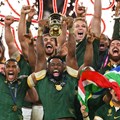The Springbok brand possesses substantial positive brand equity, fundamentally because its product (players) has outperformed competitors in the 2023 Rugby World Cup in France.

Source: Facebook WRC
Facebook RWC Dr Kuhle Zwakala, brand marketing lecturer, says the Springbok brand possesses substantial positive brand equity
Even though academic explications of brand equity are nuanced, it is widely accepted by branding scholars that brand equity is the ‘added value’ that a brand endows a product with.
When positive, brand equity leads to increased strength of positive attitudes and an intense emotional relationship between the brand and its stakeholders.
But the fundamental essence of positive brand equity is performance – the ‘thing’ (product or service experience) needs to perform, and it must perform better than its competitors to generate pleasant experiences and positive conversations among all stakeholders – this builds positive brand equity.
The consequence of these superior performances
Factually and statistically the Springboks are the most successful rugby team in the world, their superior performance is also confirmed by their strike rate at rugby world cups, the Boks have competed in eight world cups (others in 10) and were successful on four occasions.
The consequence of these superior performances over time is a deep sense of loyalty, love, emotional connection, pride, happiness, national unity, advocacy, trust etcetera.
A sense of South Africanism
Notwithstanding the Springbok’s historical racial discrimination which I suspect was adherence to the then brutal apartheid racial discrimination and segregation policies; similarly, the current Springbok team adheres to and aligns with the current government’s non-racialism posture and policies.
Hence, recent, and current Springbok teams emit a sense of relatedness and resonance with the Bok Brand, a sense of unity and pride, and a sense of South Africanism.
However, soon the euphoria will vanish into thin air, and the ‘vibe’ will fade away – so where to from here?
Extending Springbok positive brand equity
Can this Springbok positive brand equity be extended to other contexts in our society, should it even be extended to other contexts or simply be preserved and protected for its initial intended purpose, team performance?
Will we ever unite and be ‘stronger together’ as a nation and address our socio-economic ills?
Right or wrong some politicians are beating drums and questioning what the Springbok brand stands for, they draw a correlation between the current and the past regressive Springbok brand.
However, their question is rather a visual identity question rather than a brand essence, a brand truth, or a brand culture question.
Few will contest my assertion that the current Springbok brand unequivocally advances social cohesion and national unity, the brand has grown and occupies a special place in peoples’ hearts hence the positive brand equity. Robbie Wessels’ Siya Kolisi liedjie and Mgarimbe’s AmaBokoBoko’ song confirms my contention.










































